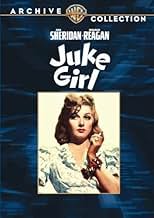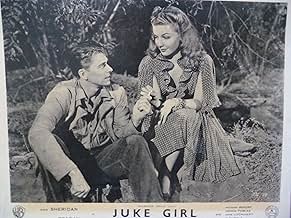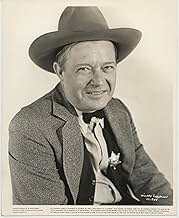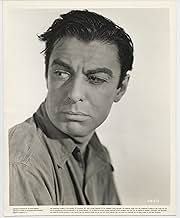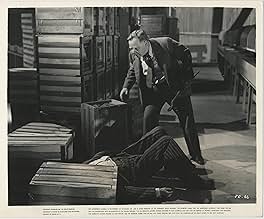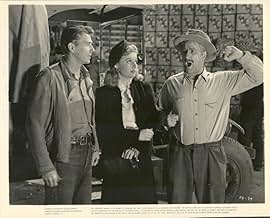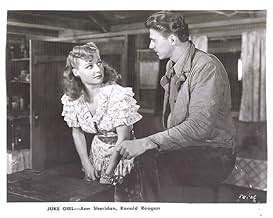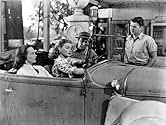Danny and Steve are migrant farm workers who wind up in Cat Tail, Florida. Cat Tail is run by Madden Packing and Danny works for Madden while Steve works for the underdog farmer named Nick. ... Read allDanny and Steve are migrant farm workers who wind up in Cat Tail, Florida. Cat Tail is run by Madden Packing and Danny works for Madden while Steve works for the underdog farmer named Nick. After the Tomato crop is destroyed by Madden, Steve takes Nick, Lola and the next crop to ... Read allDanny and Steve are migrant farm workers who wind up in Cat Tail, Florida. Cat Tail is run by Madden Packing and Danny works for Madden while Steve works for the underdog farmer named Nick. After the Tomato crop is destroyed by Madden, Steve takes Nick, Lola and the next crop to Atlanta where they sell it for big money. Danny is going up with Madden and thinks Steve i... Read all
- Director
- Writers
- Stars
- Cully
- (as Howard da Silva)
- Truck Driver
- (scenes deleted)
- Townsman
- (uncredited)
- Director
- Writers
- All cast & crew
- Production, box office & more at IMDbPro
Featured reviews
Reagan costars here with Ann Sheridan in 1942's "Juke Girl," sort of a weaker "Grapes of Wrath," with Gene Lockhart as an unscrupulous businessman who is cheating the local farmers by paying them low prices and making sure they can't sell anywhere else. Reagan and Richard Wharf, as Steve and Danny, are two drifters who arrive in a small town populated by farmers. There Steve meets and falls for Lola (Sheridan) who works in the local bar. As he endeavors to help a local farmer, Nick (George Tobias) who has fought with Madden (Lockhart) and has now seen his crops destroyed, Steve gets more than he bargained for. The result is murder.
Entertaining Warner Brothers effort, perhaps not the most original plot you've ever seen, but you'll keep watching. Ann Sheridan was kind of a poor man's Rita Hayworth - the redhead had that been around the block presence, a low voice, and a toughness, all of which were appealing in any film in which she appeared. Gene Lockhart does a great job as a bully who underneath is terrified, and George Tobias is sympathetic as Nick Garcos, who wants to buck the system. Reagan comes off well as a determined young man who believes in doing the right thing.
If you're a fan of Sheridan's or love the Warner's potboilers, this is worth seeing.
Just the opposite is true of "Juke Girl," which my wife and I just watched this evening on TCM (March, 2009). I had seen the film quite a while back and didn't think much of it. This time, however, I found the film to be quite enjoyable; no prize winner, but interesting from several standpoints. Here are some quite thoughts:
* The acting: As other reviewers have pointed out, it is quite good. The film features the Warner Brothers stock company that appeared in so many films in the late 30s and throughout the 40s. I refer to the likes of Alan Hale, George Tobias, Donald MacBride, etc. Ronald Reagan and Ann Sheridan are good in the leads.
* Photography: I second the feeling of another reviewer who commented on the film's cinematography. That is especially true of the outdoor scenes, which make up a fair amount of the running time; so many movies from the same year were shot almost entirely on sound stages. It's nice to see what Southern California looked like in the early 1940s (I feel certain that somewhere such as the San Fernando Valley stood in for Florida.)
* Politics: This story almost seems like a second tier version of the "Grapes of Wrath," with its mean, unscrupulous packing house owner and its poor but honest farmers and field workers. It's laid on a bit thick in my view, but it makes for an intriguing storyline.
* One quibble regarding plot: When the mob storms the jail, the sheriff and his deputies, who have threatened to shoot, just stand there and allow themselves to be overcome. Well, I suspect that any self-respecting lawman and his men would have blasted away at that point in their own self-defense if nothing else.
I have no doubt that some will, incorrectly, call this a B movie. Well, with Ann Sheridan as the top billed player, that is of course nonsense. It is indeed an A production, though a bit too predictable in terms of the plot to be considered first-rate. However, if you are a fan of 1940s style Warner Brothers melodramas (and I don't use that term pejoratively), you might indeed enjoy "Juke Girl."
A possible surprise for today's viewer is the political stance taken by actor Reagan in "Juke Girl" for the migrant workers and small farmers against the corruption of the local business interests, much different that the position taken by President Reagan years later. But then this picture was made many years before Reagan would become enamored of Nancy Davis and make her his second wife. She turned Reagan around in more ways than one.
The story is a good one, though a bit bottom heavy in that much of the excitement and action, including a murder, comes near the end. Steve Talbot (Reagan) and his best buddy, Danny Frazier (Richard Whorf), are hoboing across the country (the Depression was just winding down in 1942 because of World War II) looking for work of any kind with Steve preferring farm labor when they get involved with local labor unrest in a nowhere place called Cat Tail, Florida.
Just before reaching the small, farming community, a girl called Skeeter (Betty Brewer) befriends them and takes a particular liking to Steve. Her place in the story is somewhat vague other than to add a bit of humor and a down-home quality to the film. Steve and Danny hook up with the juke girl of the title, Lola Mears (Sheridan), and her co-entertainer, Murph (Faye Emerson). Steve falls for Lola but Lola puts up a tough, don't tread on me veneer when obviously inside, her heart turns to mush when Steve is near.
Looking for jobs brings them into contact with the local boss, Henry Madden (Gene Lockhart), who virtually runs the town, except surprisingly not the law. Madden's henchman, Cully (Howard Da Silva), takes a dislike to Steve and Danny from the beginning and attempts to bully them around. Danny ultimately throws in with Madden while Steve throws in with a local farmer, Nick Garcos, the Greek (George Tobias), being exploited by Madden. Thus Steve and Danny become rivals and friendly enemies. A foreman for Madden, "Yip" (Alan Hale), befriends both Steve and Danny. Eventually, Lola throws in with Steve and Nick and the fun begins.
The acting is first rate. The two leads give their usual fine performances, with such great character actors as Donald MacBride, Fuzzy Knight, Eddy Waller, aka Nugget Clark, Guy Wilkerson, aka Panhandle Perkins, Glenn Strange, aka the Frankenstein monster, and even William Hopper, aka Paul Drake, helping out in bit parts. Ann Sheridan is given an opportunity to sing and dance which is always a treat. Of special note is the talented comedian, Willie Best, as a street vendor peddling lucky rabbit feet called Jo-Mo.
The crisp black and white photography by Bert Glennon captures the look and feel of the Depression in Florida. A few of the shots are reminiscent of those by Gregg Toland in John Ford's masterpiece, "The Grapes of Wrath," not surprising since Glennon assisted Ford from time to time with his cinematography.
Juke Girl is a knock-off of The Grapes of Wrath, but without the old folks. In my opinion, Jane Darwell and Charley Grapewin were the only good parts to that movie. Both focus on the struggles of migrant farmers and the poor, common man. Both have handsome leading men who aren't very good actors. But for my money, I'll take Juke Girl. And not just because Reagan has great hair and a lovely smile. Although, that doesn't hurt.
Even though he wasn't a good actor, Reagan seemed to give his best performances when he was paired with Ann Sheridan. I hope they got along; they certainly had good chemistry together. This was made the same year as Kings Row, and it'd make a great double feature. Even though the title implies a silly movie about a dance hall romance, it actually turns dark in the second half. It's a solid drama with a strange title. Yes, Ann Sheridan plays a hardened dance hall girl who captures the heart of an idealistic farmer, but there's a lot more to it than that. Reagan stands up for George Tobias, a Greek farmer who gets pushed around, and that sets off a series of dramatic events. Gene Lockhart plays a real bad guy, coming off another villainous role in Hangmen Never Die. I don't know why he played bad guys so often, except for the reason that he's extremely good at it! Juke Girl might not be Gone With the Wind, but it's definitely one of the better Reagan movies.
The story focuses on two migrant laborers who are following the crop season in Florida and hoping for work. Their rough-and-tumble encounter with the local "boss" (Gene Lockhart, who makes a great villain although I always think of him as Bob Cratchit) breaks up their friendship, and emphasizes the tension between the boss and the farmers who depend on him for money. Reagan's attempts to help a troubled farmer just make Lockhart angrier, leading to escalating violence. Of course, in the meantime, a romance is blooming between Reagan and a local "juke girl" (Sheridan). He wants to settle down, but she's not ready.
Nicely choreographed action sequences, snappy dialog, and memorable major and minor characters make this WB feature worth seeking out.
Did you know
- TriviaIda Lupino was considered for the part, but the actress felt her accent made it an inappropriate role.
- GoofsIn the early scene at the gas station, which is supposed to be somewhere in Florida, the hills of California can clearly be seen in the background.
- Quotes
Danny Frazier: The body's familiar but I can't place the face.
Lola Mears: I never forget a face but for you I'll make an exception.
- ConnectionsFeatured in This Theatre and You (1949)
- SoundtracksI Hates Love
(1942) (uncredited)
Music by M.K. Jerome
Lyrics by Jack Scholl
Played during the opening credits
Also played at Muckeye's and sung by Ann Sheridan (uncredited)
Played often in the score
- How long is Juke Girl?Powered by Alexa
Details
- Runtime
- 1h 30m(90 min)
- Color
- Aspect ratio
- 1.37 : 1


